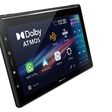More than a year and a half after it showed off its first concept for a Thunderbolt docking station, Belkin today officially began shipping its Thunderbolt Express Dock. The $299.99 dock offers users a single-cable connection for a docking station supporting a FireWire 800 port, a Gigabit Ethernet port, three USB 3.0 ports, audio in/out, and Thunderbolt passthrough.
Designed to be an easy and powerful way to increase productivity and take advantage of Thunderbolt technology, Belkin’s Thunderbolt Express Dock allows creative professionals the ability to edit films in full HD 1080p, and transfer volumes of data in seconds at bidirectional 10Gbps channels. That is up to 20 times faster than with USB 2.0 and up to 12 times faster than with FireWire 800. The Thunderbolt Express Dock uses a single high-speed connection to create ultrafast data transfers between your laptop and up to eight other devices, including FireWire, Ethernet, USB, and enables users to daisy-chain up to five additional Thunderbolt devices.
Belkin's Thunderbolt Express Dock has had a lengthy history, going through various design and pricing changes before settling on the current feature set. Belkin began taking pre-orders in mid-February, saying that the dock would begin shipping the following week, but the company ended up pushing back the launch of the dock until today.
Belkin representatives declined to offer details on the reasons for the last-minute delay, noting only that the company sought to "ensure that the product's new features and interface would deliver the best possible experience for users."

With a delayed release date for its Thunderbolt Express Dock, Belkin is not the first company to bring a Thunderbolt docking station to market, with Matrox having launched its DS1 dock back in December. CalDigit has announced its own similar solution launching sometime this summer, and Sonnet has announced an even more expansive dock incorporating both an optical drive and an integrated hard drive.
Other solutions such as the ZenDock on Kickstarter are bypassing the expensive and time-consuming implementation of single-cable Thunderbolt connections, instead opting to extend the existing port sets on the MacBook Pro and Retina MacBook Pro through an adapter to a docking station.
























Top Rated Comments
Edit: Incidentally, discrete USB 3.0 host controllers are only available in 2 or 4-port flavors at this point, and there are many issues with the very limited selection of hub chips. That is why there are only 3 USB 3.0 ports on this dock. One port is used internally for a USB audio device, and adding more would have required either a hub or an additional host controller.
Plus 2 Thunderbolt ports and a FireWire 800, did you miss them?
It's the American way ;)
Supersize me!
and this is the consequence
*Not compatible with current gen (2010) Mac Pro's.
the irony